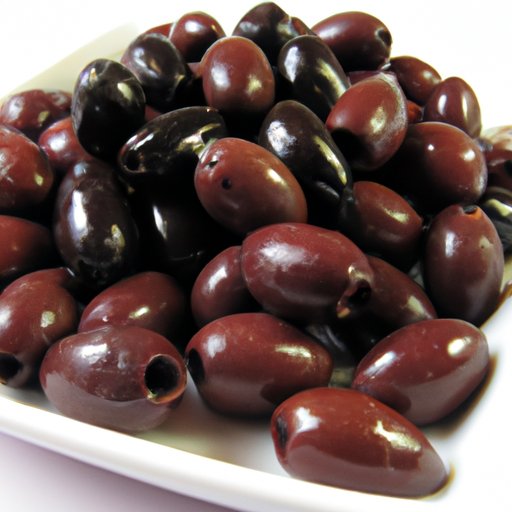Introduction
Kalamata olives are a popular type of olive native to the Mediterranean region that are prized for their rich flavor and unique texture. They are often used in salads, sauces, and other dishes to add an extra layer of flavor and texture. But beyond being a tasty addition to many dishes, kalamata olives also provide a wide range of health benefits that make them an essential part of any healthy diet.
This article will explore the nutritional benefits of kalamata olives and how they can help you reach your health goals. We will look at their macronutrient content, vitamins and minerals, other nutrients, and how they can contribute to your overall health. We will also discuss the pros and cons of eating kalamata olives, as well as the recommended intake and ways to incorporate them into your diet.
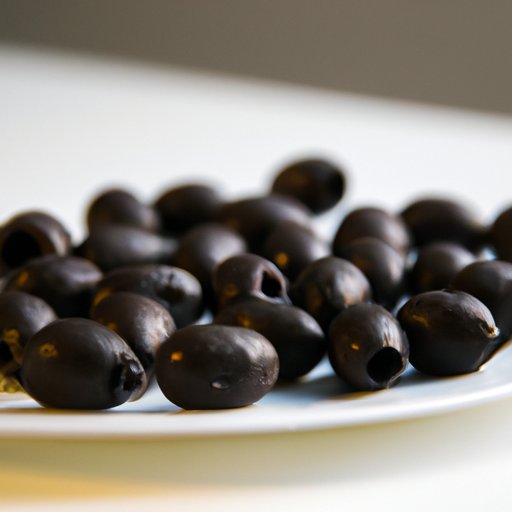
Exploring the Nutritional Benefits of Kalamata Olives
Kalamata olives are a good source of a variety of essential nutrients. Here is a breakdown of their macronutrients, vitamins, and minerals:
Macronutrients
Kalamata olives contain a moderate amount of calories (about 75 per 100 grams). They are also a good source of dietary fiber, with about 3.7 grams per 100 grams. They are also a good source of healthy fats, with 12.5 grams of total fat per 100 grams.
Vitamins and Minerals
Kalamata olives are an excellent source of vitamin E, with 6.5 milligrams per 100 grams. They are also a good source of iron, with 1.9 milligrams per 100 grams. Other vitamins and minerals found in kalamata olives include calcium, magnesium, potassium, zinc, and selenium.
Other Nutrients
Kalamata olives are also a good source of polyphenols, which are powerful antioxidants. They are also a good source of omega-3 fatty acids, which are important for heart health. Lastly, they contain a moderate amount of protein, with about 2.3 grams per 100 grams.
How Kalamata Olives Can Help You Reach Your Health Goals
Incorporating kalamata olives into your diet can help you reach a number of health goals. Here are some of the biggest benefits you can expect to see when adding them to your meals:
Improved Digestion
The high fiber content of kalamata olives can help improve digestion by increasing the bulk of stools and aiding in the passage of food through the digestive tract. This can help reduce symptoms of constipation and other digestive issues.
Lower Risk of Heart Disease
The omega-3 fatty acids found in kalamata olives can help lower cholesterol levels and reduce the risk of heart disease. Additionally, the high polyphenol content can help prevent oxidative damage to blood vessels, further reducing the risk of heart disease.
Reduced Risk of Cancer
The antioxidants found in kalamata olives can help protect cells from free radical damage, which can reduce the risk of certain types of cancer. Additionally, the high fiber content can help reduce the risk of colon cancer.
Increased Energy Levels
Kalamata olives are a good source of iron, which can help increase energy levels by carrying oxygen to cells throughout the body. This can help reduce fatigue and make it easier to stay active and alert.
A Comprehensive Guide to the Health Advantages of Kalamata Olives
While kalamata olives offer a variety of health benefits, it’s important to be aware of both the pros and cons of eating them. Here is a comprehensive guide to the health advantages and disadvantages of kalamata olives:
Pros
- High in fiber, vitamins, and minerals
- Good source of healthy fats
- Rich in antioxidants and polyphenols
- Can help improve digestion
- May reduce the risk of heart disease and cancer
- Can increase energy levels
Cons
- High in sodium
- Calorie dense
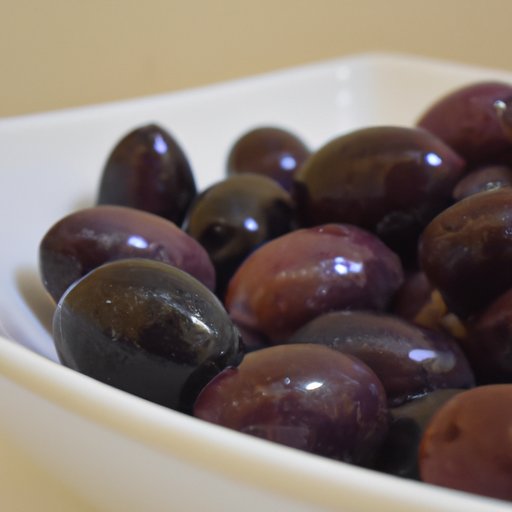
A Closer Look at Kalamata Olives and Their Role in a Healthy Diet
If you’re looking to incorporate kalamata olives into your diet, it’s important to be aware of the recommended intake and ways to pair them with other foods. Here is a closer look at kalamata olives and their role in a healthy diet:
Recommended Intake
The recommended daily intake of kalamata olives is about 28 grams per day. This is equivalent to about 10-15 olives, depending on their size.
Substitutions
If you don’t have access to kalamata olives, you can use other types of olives as a substitute. Other varieties such as black olives or green olives can be used in place of kalamata olives, though the flavor may differ slightly.
Pairing with Other Foods
Kalamata olives are often used to add flavor and texture to salads, sandwiches, pastas, and other dishes. They can also be eaten on their own as a snack. For a healthier option, try pairing them with vegetables, lean proteins, and whole grains.
Kalamata Olives: An Essential Source of Key Nutrients
Kalamata olives are an excellent source of key nutrients that can help improve your overall health. Here is a closer look at the nutrient content of kalamata olives and how they can benefit your health:
Omega-3 Fatty Acids
Kalamata olives are a good source of omega-3 fatty acids, which are important for heart health. These fatty acids can help reduce inflammation, lower cholesterol levels, and reduce the risk of heart disease.
Antioxidants
Kalamata olives are rich in antioxidants, which can help protect cells from damage caused by free radicals. This can reduce the risk of certain types of cancer and slow down the aging process.
Fiber
Kalamata olives are a good source of dietary fiber, which can help improve digestion, reduce cholesterol levels, and keep you feeling full for longer. This can help with weight loss and maintaining a healthy weight.
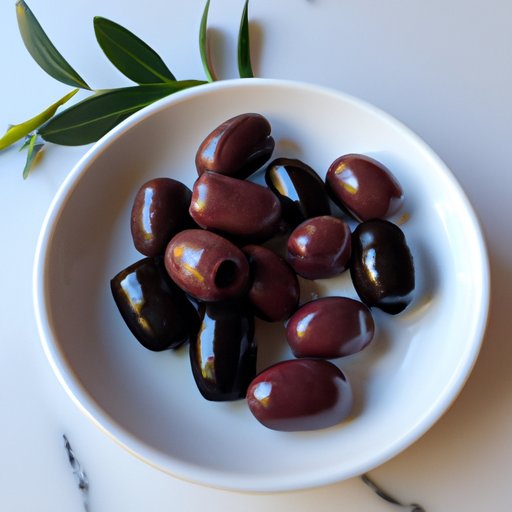
The Health Benefits of Kalamata Olives for Weight Loss
Incorporating kalamata olives into your diet can help you reach your weight loss goals. Here is a closer look at how they can help:
Appetite Control
The high fiber content of kalamata olives can help control hunger and cravings by keeping you feeling full for longer. This can help reduce calorie intake and make it easier to stick to a healthy diet.
Metabolism Boost
Kalamata olives contain a variety of vitamins and minerals that can help boost metabolism and burn fat more efficiently. This can help you lose weight faster and keep it off.
Reduced Calorie Intake
The high fiber content of kalamata olives can help reduce calorie intake by making you feel fuller on fewer calories. This can help you reach your weight loss goals without having to drastically reduce your calorie intake.
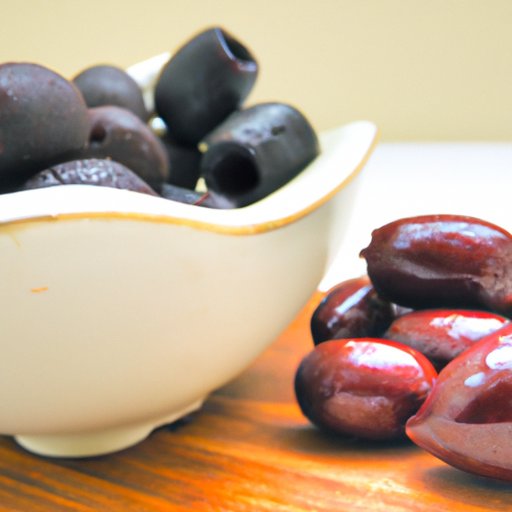
The Pros and Cons of Eating Kalamata Olives for Optimal Health
Kalamata olives offer a wide range of health benefits, but it’s important to be aware of the pros and cons of eating them. Here is a closer look at the pros and cons of eating kalamata olives for optimal health:
Pros
- High in fiber, vitamins, and minerals
- Good source of healthy fats
- Rich in antioxidants and polyphenols
- Can help improve digestion
- May reduce the risk of heart disease and cancer
- Can increase energy levels
Cons
- High in sodium
- Calorie dense
Conclusion
Kalamata olives are a tasty and nutritious addition to any diet. They are rich in vitamins, minerals, antioxidants, and fiber, and can help improve digestion, reduce the risk of heart disease and cancer, and increase energy levels. However, they are also high in sodium and calorie dense, so it’s important to be aware of the recommended intake and ways to incorporate them into a healthy diet. All in all, kalamata olives are a great way to get essential nutrients and reach your health goals.
(Note: Is this article not meeting your expectations? Do you have knowledge or insights to share? Unlock new opportunities and expand your reach by joining our authors team. Click Registration to join us and share your expertise with our readers.)
